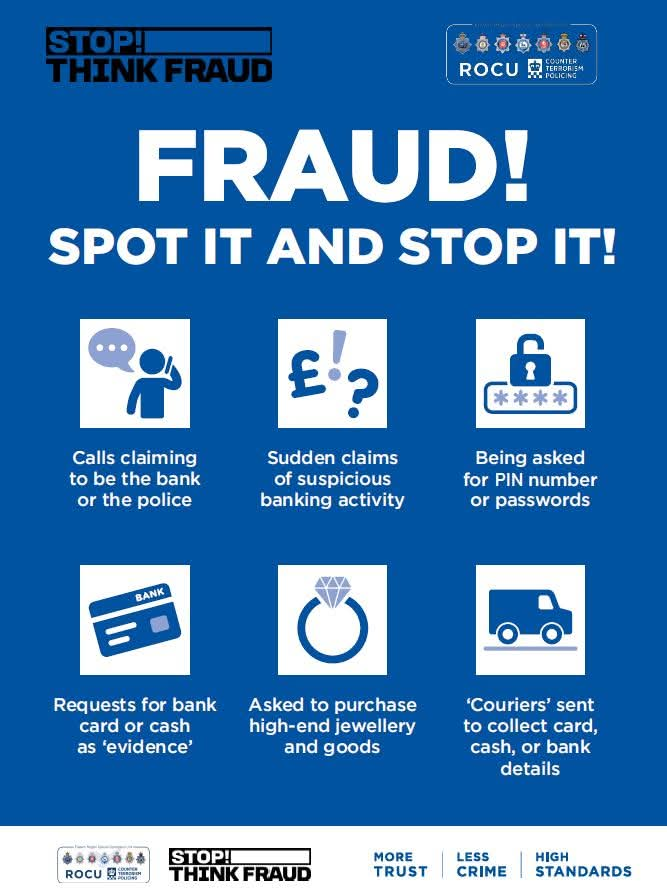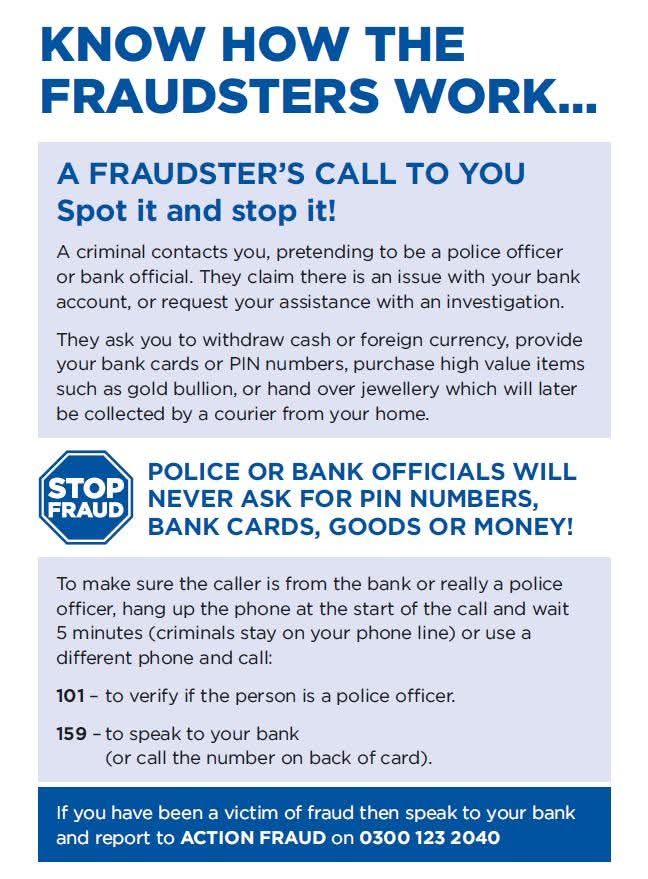- Screen Colours:
- Normal
- Black & Yellow
ALERT: WhatsApp account takeover scam
Criminals are targeting WhatsApp users by posing as a friend and asking for a security code. Action Fraud has received over 60 reports relating to this scam.
The scam begins when a criminal gets access to another WhatsApp account which has you listed as a contact.
The criminal, posing as your friend or someone that’s a member of a WhatsApp group you’re in, will then send you seemingly normal messages to try and start a conversation with you. However, around the same time you will receive a text message from WhatsApp with a six-digit code. This is because the criminal has been trying to login to WhatsApp using your mobile number. The criminal will claim that they sent you their code by accident and ask you to help them by sending it to them. Once the criminal has this code, they can login to your WhatsApp account and lock you out.
The criminal will then use the same tactic with your WhatsApp contacts in an effort to steal more accounts and use them to perpetrate fraud.
What you need to do: · Set up two-step verification to give an extra layer of protection to your account: Tap Settings > Account >Two-step verification > Enable.
· THINK. CALL. If a family member or friend makes an unusual request on WhatsApp, always call the person to confirm their identity.
· Never share your account’s activation code (that’s the 6 digit code you receive via SMS)
· You can report spam messages or block a sender within WhatsApp. Press and hold on the message bubble, select ‘Report’ and then follow the instructions.
If you have been a victim of fraud or cyber crime, report it to Action Fraud or 0300 123 2040.
(If you found the information in this alert useful, please share it with your friends and family. Social media versions of this alert can be found on Twitter, Facebook and Instagram)
Fraud! Spot it and Stop It!

|
Do you know the signs of Courier Fraud? Courier fraud: conning people out of PINs and credit card details. In most cases of courier fraud, a fraudster phones their victim and claims to be from their bank, the police or other law enforcement authority. They then con the victim into revealing their PIN and credit or debit card details. Sadly, the most common victims of courier fraud are the elderly. For more information read the handy guides or visit Door-to-door and courier fraud | Suffolk Constabulary More information can also be found about other types of fraud on Action Fraud, you can also report information to Action Fraud on 0300 123 2024 or visit their website >> Action Fraud |
 |
|
ROMANCE FRAUD: New figures from City of London Police, the National Lead Force for fraud, show that more than £106 million was lost to romance fraud in the UK last year, with more £407,923 lost in Suffolk across 114 incidents. Data from the National Fraud Intelligence Bureau (NFIB) reveals a national 9% increase in romance fraud reports in the past year financial year, with a 1.2% increase in Suffolk. On average, victims nationally lost £11,222. Detective Superintendent Oliver Little, from the City of London Police, said: "Romance fraud isn’t just a financial crime—it’s a deeply personal betrayal that can leave lasting emotional scars. For the second consecutive year, male victims have slightly outnumbered females, challenging outdated stereotypes about who is affected by these scams. “Despite this, stigma still surrounds romance fraud victims, often driven by misconceptions that they are foolish or lack judgment. In reality, criminals use sophisticated tactics to manipulate emotions and gain trust, making anyone vulnerable. “We want to remind everyone that romance fraud can happen to anyone, regardless of gender or background. If something doesn’t feel right in an online relationship, take a step back, verify identities, and seek advice. Speaking up can not only protect yourself, but also help prevent others from falling victim and bring those responsible to justice." Breaking outdated stereotypes, national data reveals that—for the second consecutive year—male victims slightly outnumber female victims, challenging the misconception that romance fraud primarily targets elderly women. However, while more men reported cases, female victims tended to lose larger sums of money. The 50-59 age group experienced the highest financial losses, totalling £22,108,334. This demographic is particularly vulnerable as they often have greater financial resources, are still in the workforce, and may be experiencing personal life changes such as divorce, separation, or the loss of a partner, making them prime targets for fraudsters. One key tactic used by scammers is ‘love bombing’, where fraudsters overwhelm victims with excessive affection, manipulation, and emotional control to create dependency. Intelligence gathered by City of London Police suggests that nearly twice as many female victims engaged with suspects for a year or more compared to males. Romance fraud isn’t just about losing money — it’s about emotional betrayal, psychological harm, and the erosion of trust. City of London Police urges the public to question suspicious relationships, verify identities, and protect both their hearts and their bank accounts. How to stay safe from romance fraudsters:
It is important that no matter how long you’ve been speaking to someone online and how much you think you trust them, if you have not met them in person, it’s important that you do not:
|